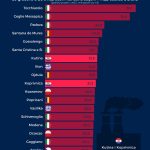Just how did branding help some of the most powerful and recognisable Croatian labels develop cult-like status on the global market?
The business climate it bad. The investment climate is bad. The bureaucratic climate is bad. With just how often these statements are repeated, you’d think that the only climate that is good in Croatia is the weather.
While it’s true that there is a lot to be desired for when it comes to doing business or being an entrepreneur in Croatia, the depressing tales about how ”impossible” everything is aren’t always so true. In any case, they aren’t the rule. Many success stories have come, do come, and will continue to come out of this country, and in spite of the various obstacles in the way, reaching professional goals isn’t an impossible task if you’re patient and determined.
To highlight that fact, Poslovni Dnevnik writes about some of the much more uplifting, positive stories from the heads of some of Croatia’s top companies.
Dragutin Drk, director of Vindija’s business system
What was most important for me was that ”Quality of Vindija” (Kvaliteta Vindija) became and remains a catchphrase with good strength behind it.
In the almost sixty-year history of the Vindija Group, during which we’ve grown from small town dairies to one of the regional leaders within the food industry, we’ve continually worked on the development and the strengthening of our brands. From the very beginning, we knew that product branding was the key to quality communication with the market, an important factor of trust and customer loyalty, and the basis for doing successful business in our sector.
Brands alongside which generations have grown up, such as Vindija’s z’bregov, are the favorite choice of customers in Croatia and in the region today despite the wider choice of competing products in different price ranges, and even a few decades ago, as we are today, we were well aware that the buyer must also be bonded by emotion with the products, and feel good about choosing our brands.
On that same line, I wanted unquestionable quality to stand behind the stories and the emotions because I’m convinced that the food industry has a special, additional responsibility to its customers – we’re responsible for their safety, their health, and the long-term welfare of the whole family. In all that we’ve been doing over the decades, through the marketing trends and the news in market communication, it was most important for me that “Quality of Vindija” became and remains a catchphrase with good strength, that the concept of quality is linked to each and every one of our products, and that it derives from the reality of our product creation.
Quality as a key, from raw material selection, to recipe and technology, to numerous safety and health controls. I’m happy that we’re able to tell the story from the beginning to the end through our leading brands on the market, from field to table, because the whole process takes place under the “Quality of Vindija”.
Through our business development and our constant investment in innovation and technology, our brands have added new features. Thus, Cekin and Vindon have become the first domestic brands on a certified GMO free product line, and our customers know that fresh chicken and turkey from our assortment is also bred and produced without genetically modified organisms. This is a segment that makes us just as the slogan says we are – totally different from the others.
Damir Bulić, President of Kraš’s Management
The strongest brand of our company is Kraš itself.
Managing brands today is the biggest challenge of the marketing profession. When a tradition of over 100 years, a portfolio of 20 strong and marketed brands and over 200 different products is on your side, and this is exactly what Kraš is – that challenge is even greater.
The strongest brand of our company is Kraš itself, with which consumers have created a close relationship, but they also have expectations. Today’s consumers expect much more than they did before, quality and reliability are implied, and the emotional component is what sets us apart from the competition. Our company’s biggest assets are our brands, which have been an integral part of consumer life for a whole century, and some of them, such as Bajadera, Griotte, Životinjsko Carstvo (Animal Empire), Bilo kuda Ki-Ki svuda sweets or Domaćica biscuits, and Dorina chocolate, have developed a cult-like status.
In twenty years, there’s been intensifying efforts to strengthen brands and reach out to consumers through interesting content, the introduction of new flavours, co-branding products, events, and using brand ambassadors like Croatian football players, passionate fans of Domaćica. Since 1911, when we spread the scent of chocolate for the first time over Zagreb, we’ve come a long way, but the customer has always been at the very centre of our interest.
Our brands have changed but have always kept their ties with the end consumer and their needs, and this is their highest value, but also a good foundation for the future. In order to maintain continuity with the attention of consumers, as well as to attract new segments, great attention is paid to development activities, and our brands are constantly facing innovation, and we’re always strengthening new products. Last year, we came out with as many as twenty new products and new innovations, and the most important project in 2017 was the celebration of Domaćica’s sixtieth anniversary. The strength of Kraš’s brands is perhaps most visible in the co-branding palettes of Dorina chocolate that took the markets of the region by storm.
When it comes to brand management, Kraš went one step further, constantly generating added value for the consumer: the focus on them and their needs has been manifested even through our social projects such as Kraševa Slatka Bajka (Kraš’s Sweet Fairytale) or Ekopark Krašograd (Kraštown Eco-park).
Marin Pucar, Podravka’s CEO
Brand power directs people to you.
In today’s world, the success of a company’s business depends largely on the strength of the brand – whether it’s the brand of an individual product or at corporate level. Today, thanks to modern technology, everyone is available at just one click, it’s exactly the strength and value of a brand that will make that click a decision to buy or invest in your direction. In our industry, all players meet the needs of their customers, but the values of the brand are precisely the link we create with our consumers, our employees, our partners, our suppliers, and with our investors.
This is what an added value presents as and if it is properly managed, it multiplies the value of the entire company. A brand isn’t just a visual or a name, it represents the small part that is the most visible part of the value of the brand.
The successful brand, both corporate, and the brand of a single product, implies much more. A successful brand is the result of strong research and development, high quality, efficient production, quality management, as well as a sophisticated supply system and efficient sales. This is what isn’t seen out there, but if something in that process isn’t working properly, the success of the business, and thus the value of the brand, is endangered. At Podravka’s core, we’re going forward with the core values, which are creativity, trust, passion, consumer satisfaction, and excellence, and we’ve been successfully doing this for over seventy years on more than sixty markets.
From the very beginnings, our values have being built into all of our products and brands, some of which, like chicken and beef soup, goulash and pâté, have already become legends with a tradition spanning sixty years. We can’t forget Vegeta, which is the most famous original Croatian product and a kind of phenomenon, because it has become an integral part of the kitchens of consumers from more than fifty countries around the world. Along with these well-known, old-age brands, we’re systematically working on the construction and upgrading of our other younger brands such as Lina, Dolcele, Fanta… with continuous refreshment, so that along with our already faithful older customers, we can attract the younger ones with whom we’ll build the future of Podravka as brand number one!
Ivan Artuković, Franck’s management
The market and tradition proves that we’re on a good path.
There are countless definitions of what a brand is, but at Franck, we consider the brand to only build the marketing approach at the end stages. Prior to that come investment in production, the supply of premium raw materials, innovation and new product development, regular market research, and efficient distribution.
Only then is the level trust of consumers gained that Franck has, as a brand and as a synonym for quality for 125 years. Innovations and defining market trends in the tea and coffee categories are the guidelines that we’ve adhered to from the very beginning. We continue to apply them today with a lot of novelty in the tea category, which provided us with the leading position on the domestic market both in the channel of trade and in the HoReCa channel.
In line with global trends, Franck also pays great attention to packaging – we’ve redesigned our tea packaging for the purpose of educating our consumers. In the new redesigned edition, we also provided a compass with information about the properties of tea, as well as additional information on tea, its processing and its preparation.
We’re approaching the creation and the strengthening of coffee brewing culture in the same way: the new Jubilarna packaging boasts raw material information, a graphic display of taste intensity and information on the natural flavourings in the coffee. Franck’s Jubilarna, Gloria and Espresso coffees are also labelled with a “Croatian Quality” label which acts as additional proof that they meet the highest standards of quality.
Market results show us if we’re on the right track. According to Nielsen data, in 2017, in the category of ground coffee, Franck additionally increased its sales and confirmed its position as category leader in Croatia with 56% of the quantity and 58.2% of the market share. In the tea category, there was growth of almost 56 percent of the value, and 54.5 percent of the volume share. The cappuccino category recorded a growth of 50 percent with regard to volume, and 49 percent of the value share.
Growth trend and equally good sales results were achieved in all primary markets and in all channels in Croatia, Bosnia and Herzegovina, and Slovenia, as well as on other markets in the region. This is where the strength of our brand is reflected, because consumers also recognise us on key markets outside of Croatia, and they believe in our products.







